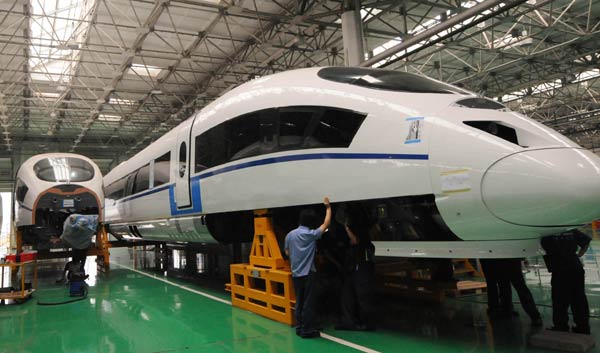An assembly line of CNR Corp in Tangshan, Hebei province. The merger of CNR Corp and CSR Corp has gained approval from overseas antitrust regulators in Australia, Germany, Pakistan and Singapore, without any additional items or obligations. [Photo/Xinhua]

'One Belt, One Road' initiatives lead to more chances for international contracts
The titans of the rail equipment and infrastructure sectors have become leading beneficiaries of the nation's industrial upgrading boom and "going global" strategy, and that edge has shown up in their annual results.
Many countries want to improve their regional connections and transportation infrastructure, leading to a surge in deals for CSR Corp and CNR Corp. The country's top two rail equipment manufacturers have reported net profit of 5.32 billion yuan ($858 million) and 5.49 billion yuan, respectively, in 2014, up 28 and 33 percent.
China Railway Engineering Corp and China Railway Construction Co, the largest domestic rail network builders, achieved net profit of 10.36 billion yuan (up 10.5 percent) and 11.34 billion yuan (up 9.65 percent) in 2014.
Wang Mengshu, an academic at the Chinese Academy of Engineering, said that many contracts are being offered as developing nations accelerate their urbanization and industrialization.
The opportunities are likely to increase, Wang said, as a result of China's Silk Road Economic Belt and 21st Century Maritime Silk Road initiatives, along with the China-led Asian Infrastructure Investment Bank.
"Although the Silk Road initiative is still in its early stages, it could have deep economic implications for regional trade, especially as it coincides with a renewed push from international companies and commodity producers in Southeast Asia, Central Asia, the Middle East and Eastern Europe," said Wang.
China also plans to invest 32 billion yuan to build Russia's first high-speed rail line connecting Moscow and Kazan, Russian media reported last week.
The Moscow-Kazan line forms the initial section of a Eurasian high-speed railway linking Beijing and Moscow, with completion scheduled for 2018 in time for the World Cup soccer finals in Russia. Kazan is one of the host cities.
Zhi Luxun, deputy director-general of the department of foreign trade at the Ministry of Commerce, said that China will support rail equipment makers in widening their global services and production networks to compete with more established rivals in different regional markets this year.
China has exported railway technology to more than 30 countries and regions, with contractors involved in 348 overseas railway infrastructure construction projects in countries including Kenya, Thailand and Saudi Arabia last year, up 48 percent from a year earlier. They signed contracts worth $24.7 billion with clients worldwide.
The overseas expansion was driven by State-owned CNR and CSR, whose exports accounted for 70 percent of the total value.
"Based on the World Trade Organization's rules, China will combine this fast-growing industry with its rich financial resources to expand its capability to use foreign capital, such as supporting companies to issue bonds to raise funds overseas," Zhi said.
Chinese firms involved in the railway sector can use price competitiveness, quality global operations and after-sales service networks, plus government support, to win deals in emerging and developed markets.
Premier Li Keqiang has promoted high-speed rail technology in Thailand, the United Kingdom, Russia and India. To reduce competition among Chinese companies in the global market, State-owned train manufacturer CNR and CSR will merge into a new company with a value of $26 billion.
